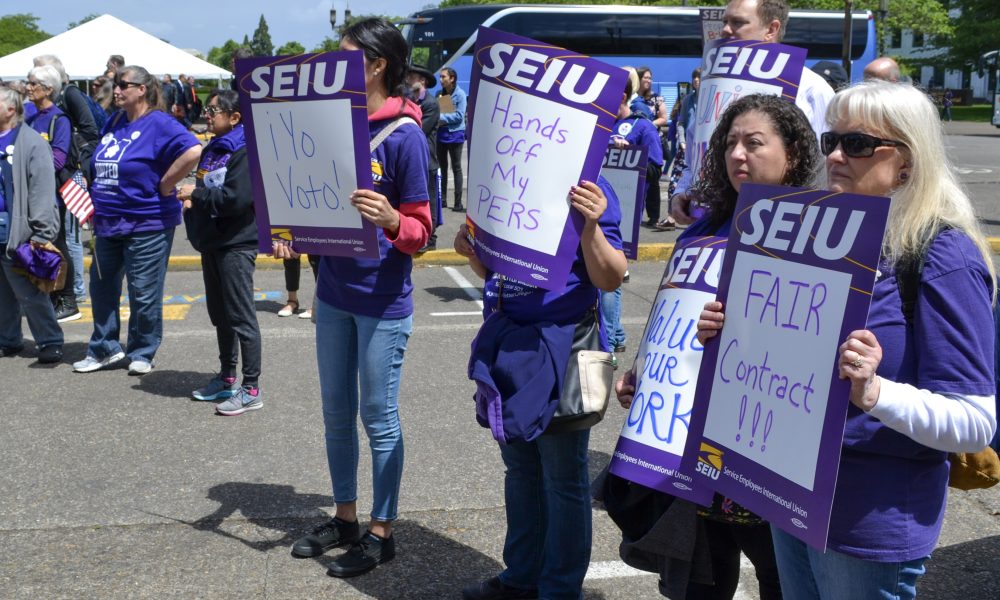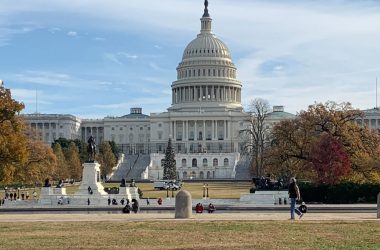
One of the state’s largest public employee unions rallies outside the Capitol on Monday, May 20. (Claire Withycombe/Oregon Capital Bureau)
SALEM — Up to 30,000 Oregon workers may no longer automatically support their union as concerted national efforts to trim the political power of unions gain steam.
A change in an obscure federal rule may pose a financial threat to one of Oregon’s largest public sector unions while also crimping the ability of home care workers to save for retirement.
The federal agency overseeing public health care for elderly and low-income people earlier this month moved to ban certain voluntary deductions from federally-funded paychecks for home care workers.
The new rule may mean that about 30,000 Oregon workers can’t have union dues and retirement savings automatically taken from their paychecks. But Oregon and four other states are contesting the move.
The rule creates a financial roadblock for one of the most active unions in Oregon politics.
Service Employees International Union Local 503 represents the workers who care for about 20,000 Oregonians. Home care workers help elderly people and people with disabilities with bathing, dressing and other daily activities.
The service is paid for through Medicaid and the new rule says such money can’t be diverted out of paychecks to third parties even if a worker is willing.
The change impacts American workers who have only recently organized for better wages and other benefits, many of them women and people of color, the unions representing them say.
Oregon home care workers, considered public employees, have relied on collective bargaining since 2001.
Since then, the average home care worker, once not even required to be paid minimum wage, has received a roughly $12 per hour pay bump, according to SEIU Local 503.
But those workers aren’t considered full public employees: they don’t receive a public pension, for example.
There are other ways the union could collect dues to pay the costs of collective bargaining, including credit cards and bank drafts, said Ben Morris, a spokesman for SEIU Local 503.
But he said the rule change is a politically-motivated attempt to undercut the union.
“The goal of doing something like this is you’re hoping people don’t follow through to that new system and that you lose revenue,” Morris said.
Dues to SEIU Local 503 are 1.7 percent of monthly salary plus $2.75, according to U.S. Department of Labor records.
The union collected about $28 million in dues in 2018, according to the federal reports.
The change could also affect retirement savings for home care workers.
Many have opted in to OregonSaves, a new state program that provides a retirement savings account for people who don’t get one at work.
State Treasurer Tobias Read, a Democrat, has criticized the federal rule change for preventing payroll deductions for retirement plans.
“Homecare and personal support workers were one of the key groups who fought for the creation of the program because they have no other retirement option through their employers,” Read said in a statement. “The rule is an overt attack on the homecare workers union, SEIU.”
In recent years, “right-to-work” groups have moved to undercut the political power of public employee unions, which typically donate significantly to liberal causes and Democrats.
And the U.S. Supreme Court has weighed in, handing down two major decisions that affect unions’ ability to raise money.
In 2014, the court said unions couldn’t compel membership or “fair share” fees for public workers like home care workers.
And last year, the U.S. Supreme Court sided with Illinois child support specialist Mark Janus in his case against another union, concluding that no public workers could be forced to pay those fees.
The Freedom Foundation, an Olympia, Wash., group that advocated for the rule change, said it’s motivated to protect the civil liberties of workers.
“What we object to is the coercive practices we’ve seen that all rely on payroll deduction as a method of dues collection,” said Maxford Nelsen, director of labor policy at the Freedom Foundation.
The Freedom Foundation said in a news release that it started “calling on the federal government” in 2017 to stop allowing the automatic deductions.
“The move is the latest development in a multi-year effort by the Freedom Foundation to stop unions from taking advantage of home caregivers on the West Coast and throughout the nation,” said Ashley Varner, the foundation’s vice president of communications and federal affairs.
The foundation was formed in 1991 by former Washington gubernatorial candidate, Bob Williams, as the Evergreen Freedom Foundation. It has recently expanded to Oregon and California.
The Guardian reported in 2016 that in a speech that year to Americans For Prosperity — funded by David Koch and Charles Koch, brothers and well-known donors to conservative causes — the Oregon coordinator of the Freedom Foundation told the audience that the group’s “No. 1 stated focus is to defund the political left.”
Labor groups, and particularly public employee unions, are active political donors in Oregon.
In 2018, the Service Employees International Union gave $3.9 million to state political campaigns in Oregon, according to the National Institute on Money in Politics.
SEIU Local 503 spent $2.2 million on political activities and lobbying last year, according to the organization’s annual report, maintained by the U.S. Department of Labor.
In 2014, the Obama Administration said states could allow payroll deductions for things like union fees and health insurance.
This month’s change reverses that rule, which Nelsen said conflicted with federal laws that have been in place since the 1970s.
In a lawsuit filed last week in California, plaintiffs that include Oregon Attorney General Ellen Rosenblum argue that Congress intended only to prevent fraud.
“Congress implemented that provision to prohibit a fraudulent medical-financing scheme that bears no relationship whatsoever to legal payroll deductions such as union dues or other worker benefits,” the lawsuit stated.
Nelsen contended the rule change shouldn’t weaken unions.
“The union should be able to make the case to its members that membership is valuable,” Nelsen said, “And if they can do that, they have nothing to worry about.”
The National Right to Work Foundation also sought the rule change.
That group says its “mission is to eliminate coercive union power and compulsory unionism abuses through strategic litigation, public information and education programs,” and in a 2017 press release said it had brought the issue to the attention of the Centers for Medicare and Medicaid Services.
Since the Janus ruling, the Freedom Foundation has mobilized to inform Oregon public workers that they don’t have to pay union fees, standing outside of agency buildings and knocking on doors. The foundation also launched a texting campaign to inform union members they can opt out, and have sent emails and mailers.
Two years ago, the Freedom Foundation claimed that membership in SEIU Local 503 had dropped off significantly, citing public records.
SEIU Local 503 says those claims were unfounded, but won’t publicly disclose the number of members who pay full dues.
The union says that membership has grown 2 percent after the Janus decision nearly a year ago, in June 2018.
Reporter Claire Withycombe: [email protected] or 971-304-4148. Withycombe is a reporter for the East Oregonian working for the Oregon Capital Bureau, a collaboration of EO Media Group, Pamplin Media Group, and Salem Reporter.
SUBSCRIBE AND HELP — Salem Reporter relies almost exclusively on reader subscriptions to fund its operations. For $10 a month, you get breaking news alerts, emailed newsletters and around-the-clock access to our stories. We depend on subscribers to pay for in-depth, accurate news. Help us grow and get better with your subscription. Sign up HERE.










